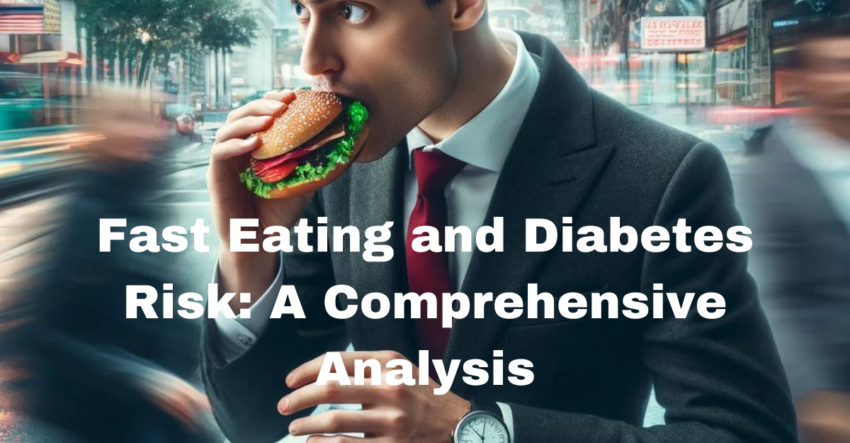Rapid Dining is linked to Increased Diabetes Risk, Studies Confirm
Recent research highlights a significant link between fast eating and an increased risk of developing type 2 diabetes. This article explores two critical studies that illuminate how rapid meal consumption could potentially lead to higher diabetes incidence, offering new insights into a modifiable risk factor that could impact public health recommendations.
Key Findings: Fasting Eating
-
Study 1: Epidemiological Evidence from Japan
- A substantial cohort study in Japan monitored 197,825 participants without diabetes over three years, revealing that fast eaters had a 30.9% incidence rate of developing diabetes compared to 26.1% among those who ate more slowly. The association persisted as a significant risk factor even after adjusting for variables such as BMI, age, and lifestyle factors.
-
Study 2: Mechanistic Insights and Global Data
- A review that synthesised data from multiple international studies focused on the physiological impacts of fast eating. It highlighted that fast eaters tend to experience delayed sensations of fullness, potentially leading to excessive calorie intake and spikes in glucose and insulin levels, thereby increasing the risk of insulin resistance, a precursor to diabetes.
Study Insights:
-
Physiological Mechanisms:
Fast eating may interfere with the natural digestion process and the signaling of satiety cues to the brain, leading to overeating. This can result in elevated postprandial glucose levels and increased demands on insulin production, both of which are critical factors in the development of insulin resistance. -
Global Epidemiological Trends:
The consistency of findings across various population studies indicates that regardless of dietary composition, the speed of eating significantly affects metabolic health, highlighting it as a universal risk factor. -
Modifiable Lifestyle Factor:
Given its association with an increased risk of diabetes, modifying how quickly one eats could serve as an effective intervention to decrease the likelihood of developing this chronic condition.
Expert Commentary:
The focus on what is eaten is indeed essential, but the above research findings suggest that the rate at which we eat can have just as significant an impact on our health. Encouraging slower eating speeds could emerge as a simple, cost-effective approach to help mitigate the global rise in diabetes.
Public Health Implications:
The evidence suggests that public health initiatives could benefit from incorporating strategies that encourage slower eating speeds. This could include educational campaigns and dietary guidelines that promote taking more time during meals as a method to enhance satiety cues and reduce overall caloric intake, ultimately helping to prevent diabetes.
Conclusion:
The relationship between fast eating and a heightened risk of diabetes is now well-documented through recent studies. This modifiable eating habit presents a tangible target for preventive health strategies, advocating for a cultural and behavioural shift towards slower eating to support diabetes prevention on a broader scale.
References:
-
Kudo, A., Asahi, K., Satoh, H., Iseki, K., Moriyama, T., Yamagata, K., Tsuruya, K., Fujimoto, S., Narita, I., Konta, T., Kondo, M., Shibagaki, Y., Kasahara, M., Watanabe, T. & Shimabukuro, M. (2019) ‘Fast eating is a strong risk factor for new-onset diabetes among the Japanese general population’, Scientific Reports, 9(8210). Available at: https://doi.org/10.1038/s41598-019-44477-9
-
Gudi, S.K. (2020) ‘Eating speed and the risk of type 2 diabetes: explorations based on real-world evidence’, Annals of Pediatric Endocrinology & Metabolism, 25(2), pp. 80-83. Available at: https://doi.org/10.6065/apem.2040028.014.

